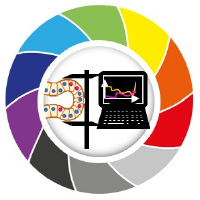Divide and rule
Divide and rule#
Sometimes, programs become very long and hard to read. We speak of spaghetti code.
from skimage.io import imread
from skimage.morphology import white_tophat, disk
from skimage.filters import gaussian, threshold_otsu
from skimage.measure import label, regionprops_table
import pandas as pd
import numpy as np
image = imread("../../data/blobs.tif")
footprint = disk(15)
background_subtracted = white_tophat(image,
footprint=footprint)
particle_radius = 5
denoised = gaussian(background_subtracted,
sigma=particle_radius)
binary = denoised > threshold_otsu(denoised)
labels = label(binary)
requested_measurements = ["label", "area", "mean_intensity"]
regionprops = regionprops_table(image,
labels,
properties=requested_measurements)
table = pd.DataFrame(regionprops)
mean_total_intensity = np.mean(table["area"] * table["mean_intensity"])
mean_total_intensity
17136.90322580645
A common and easy way for making such code easier to read is to split it into sections which start with a comment each.
# configuration
file_to_analyze = "../../data/blobs.tif"
background_subtraction_radius = 15
particle_radius = 5
requested_measurements = ["area", "mean_intensity"]
# load data
image = imread(file_to_analyze)
# preprocess image
footprint = disk(background_subtraction_radius)
background_subtracted = white_tophat(image,
footprint=footprint)
denoised = gaussian(background_subtracted,
sigma=particle_radius)
# segment image
binary = denoised > threshold_otsu(denoised)
labels = label(binary)
# extract features
regionprops = regionprops_table(image,
labels,
properties=requested_measurements)
table = pd.DataFrame(regionprops)
# descriptive statistics
mean_total_intensity = np.mean(table["area"] * table["mean_intensity"])
mean_total_intensity
17136.90322580645
More professional would be to put all this code into meaningful sub-routines and call them from a central function.
# reusable functions
def preprocess_image(image, background_subtraction_radius, particle_radius):
"""Apply background removal and denoising"""
footprint = disk(background_subtraction_radius)
background_subtracted = white_tophat(image, footprint=footprint)
denoised = gaussian(background_subtracted, sigma=particle_radius)
return denoised
def segment_image(image):
"""Apply thresholding and connected component analysis"""
binary = image > threshold_otsu(image)
labels = label(binary)
return labels
def extract_features(image, labels, requested_measurements):
"""Measure specified properties"""
regionprops = regionprops_table(image,
labels,
properties=requested_measurements)
table = pd.DataFrame(regionprops)
return table
def analyse_average_total_intensity(filename,
background_subtraction_radius = 15,
particle_radius = 5):
"""Load an image, segment objects and measure their mean total intensity."""
image = imread(filename)
denoised = preprocess_image(image,
background_subtraction_radius,
particle_radius)
labels = segment_image(denoised)
requested_measurements = ["area", "mean_intensity"]
table = extract_features(image,
labels,
requested_measurements)
# descriptive statistics
mean_total_intensity = np.mean(table["area"] * table["mean_intensity"])
return mean_total_intensity
# configuration
file_to_analyze = "../../data/blobs.tif"
This central function can then be read easily; it has just 6 lines of code
analyse_average_total_intensity(file_to_analyze)
17136.90322580645
This function can then be reused also for other image files.
analyse_average_total_intensity("../../data/BBBC007_batch/20P1_POS0005_D_1UL.tif")
884.2620087336245

